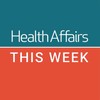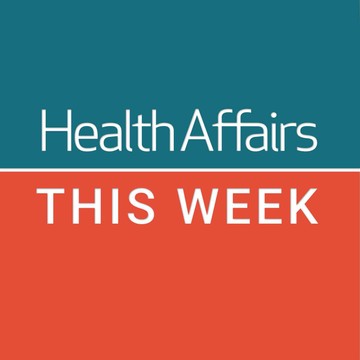

Health Affairs This Week
Health Affairs
Health Affairs This Week places listeners at the center of health policy’s proverbial water cooler. Join editors from Health Affairs, the leading journal of health policy research, and special guests as they discuss this week’s most pressing health policy news. All in 15 minutes or less.
Episodes
Mentioned books

Jul 29, 2022 • 15min
ACA Anti-Discrimination Rule w/ Katie Keith
Listen to Katie Keith, Jessica Bylander, and Leslie Erdelack unpack the latest proposed rule from HHS implementing Section 1557 of the Affordable Care Act.Section 1557 prohibits discrimination on the basis of race, color, national origin, sex, age, and disability in certain health programs and activities. The proposed rule would reinstate civil rights protections for patients and consumers after the 2020 version of the rule limited the scope of these protections.Currently, more than 70 percent of our content is freely available — and we’d like to keep it that way. With your support, we can continue to keep our digital publication Forefront and podcasts free for everyone.Related Links:HHS Proposes Revised ACA Anti-Discrimination Rule (Health Affairs Forefront)Proposed Rule Press ReleaseFact SheetSupreme Court Finds LGBT People Are Protected From Employment Discrimination: Implications For The ACA (Health Affairs Forefront)Subscribe: RSS | Apple Podcasts | Spotify | Castro | Stitcher | Deezer | Overcast

Jul 22, 2022 • 11min
The 988 Lifeline, Mental Health, and More
Listen to Health Affairs' Kathleen Haddad and Ellen Bayer discuss the new hotline and mental health initiatives in the Bipartisan Safer Communities Act.If interested in the Amazon-One Medical news from the week, listen to the limited podcast series Piecemeal produced for Health Affairs by Lalita Abhyankar.Currently, more than 70 percent of our content is freely available — and we’d like to keep it that way. With your support, we can continue to keep our digital publication Forefront and podcasts free for everyone.Related Links:US Transition to 988 Suicide & Crisis Lifeline Begins Saturday (HHS)Transforming Mental Health and Addiction Services (Health Affairs)Strengthening Behavioral Healthcare To Meet The Needs Of Our Nation (Health Affairs Forefront)Bipartisan Safer Communities ActPodcast: The Mental Health Crisis (Health Affairs Pathways) Subscribe: RSS | Apple Podcasts | Spotify | Castro | Stitcher | Deezer | Overcast

Jul 15, 2022 • 12min
Federal & State Health Policy Actions After Roe v. Wade Overturn
Listen to Health Affairs' Rob Lott and Vabren Watts discuss the federal and state aftermath following the Supreme Court overturn of Roe v. Wade.Currently, more than 70 percent of our content is freely available — and we’d like to keep it that way. With your support, we can continue to keep our digital publication Forefront and podcasts free for everyone.Related Links:Women's Live and Health: Mere Abstractions In The Leaked Dobbs Abortion Opinion (Health Affairs Forefront)As Mississippi Debates Abortion, Maternal Mortality Remains High (Jackson Free Press)HHS Secretary Letter to Health Care Providers About Emergency Medical Care FACT Sheet: President Biden To Sign Executive Order Protection Access to Reproductive Health Care Services (White House)Biden Admin to Pharmacies: Refusing to Fill Contraception and Abortion Pill Prescriptions Could Break Federal Law (Politico)Subscribe: RSS | Apple Podcasts | Spotify | Castro | Stitcher | Deezer | Overcast

Jul 8, 2022 • 15min
CMS Rule Recap: Rural Emergency Hospitals and Price Transparency
Listen to Health Affairs' Leslie Erdelack and Kathleen Haddad discuss the Centers for Medicare and Medicaid Services latest measures regarding rural emergency hospitals and price transparency for hospitals and payers.Currently, more than 70 percent of our content is freely available — and we’d like to keep it that way. With your support, we can continue to keep our digital publication Forefront and podcasts free for everyone.Related Links:CMS's Proposed Rule for Conditions of Participation for Rural Emergency Hospitals and Critical Access Hospital UpdatesPodcast: Hospitals At Large Are Failing At Price Transparency (Health Affairs This Week)Now Insurers and Employers Have To Reveal Health Care Prices (The Washington Post)Offering A Price Transparency Tool Did Not reduce Overall Spending Among California Public Employees And Retirees (Health Affairs)Price Transparency - Promise and Peril (JAMA)Subscribe: RSS | Apple Podcasts | Spotify | Castro | Stitcher | Deezer | Overcast

Jul 1, 2022 • 14min
Budget Neutral Medicaid Demonstrations w/ Cindy Mann
Listen to Health Affairs' Chris Fleming interview Manatt Health's Cindy Mann on budget neutrality requirements for Medicaid 1115 demonstrations.This episode was recorded on June 23, 2022.Related Links:Rethinking The Budget Neutrality Requirement for Medicaid 1115 Demonstrations (Health Affairs Forefront)Currently, more than 70 percent of our content is freely available — and we’d like to keep it that way. With your support, we can continue to keep our digital publication Forefront and podcasts free for everyone.Subscribe: RSS | Apple Podcasts | Spotify | Castro | Stitcher | Deezer | Overcast

Jun 24, 2022 • 9min
LGBTQ+ & Public Health
As part of Pride Month, listen to Health Affairs' Jessica Bylander and Kathleen Haddad discuss the White House's executive order on LGBTQI+ equality and its impact on health care.Related Links:Privately Insured Transgender People Are At Elevated Risk For Chronic Conditions Compared With Cisgender Counterparts (Health Affairs)Podcast: A Health Podyssey with Landon HughesLesbian, Gay, And Bisexual Adults Report Continued Problems Affording Care Despite Coverage Gains (Health Affairs)The Battle Over Gender Therapy (The New York Times Magazine)2022 National Survey on LGBTQ Youth Mental Health (The Trevor Project)Currently, more than 70 percent of our content is freely available — and we’d like to keep it that way. With your support, we can continue to keep our digital publication Forefront and podcasts free for everyone.Subscribe: RSS | Apple Podcasts | Spotify | Castro | Stitcher | Deezer | Overcast

Jun 17, 2022 • 9min
Pharmacy Benefit Managers, the FTC & You
Last week, the Federal Trade Commission launched a formal inquiry into pharmacy benefit managers (PBMs).Listen to Health Affairs' Leslie Erdelack and Vabren Watts discuss the FTC's probe into PBMs and how vertical integration and consolidation may affect patients and health care consumers.Related Links:FTC Launches Investigation Into Major Pharmacy Benefit Managers' Business Practices (FierceHealthcare)A Six-Step Solution To The PBM Problem (Health Affairs Forefront)On Drug Prices, Pharmacy Benefit Managers Are Not The Problem (Health Affairs Forefront)PBM Oversight, Insulin Cost-Sharing Provisions Among Build Back Better Act (Health Affairs Forefront) Currently, more than 70 percent of our content is freely available — and we’d like to keep it that way. With your support, we can continue to keep our digital publication Forefront and podcasts free for everyone.Subscribe: RSS | Apple Podcasts | Spotify | Castro | Stitcher | Deezer | Overcast

Jun 10, 2022 • 9min
Headlines: Monkeypox, Medicare Trustees Report & Nursing Home Workforce Shortages
Listen to Health Affairs' Jessica Bylander and Ellen Bayer go over the big health policy headlines from this week, including what we know about Monkeypox, the implications of the latest Medicare Trustees Report, and nursing home workforce shortages.Related Links:2022 Medicare Trustees Report (CMS)Medicare's Supplementary Medical Insurance Fund: A Growing Burden on Taxpayers (Health Affairs Forefront)The Coming Crisis For The Medicare Trust Fund (Health Affairs Forefront)Fact Sheet: Protecting Seniors by Improving Safety and Quality of Care in the Nation's Nursing Homes (White House)The Waltz: To Improve Nursing Home Care, Invest In The Workforce (Health Affairs Forefront)Currently, more than 70 percent of our content is freely available — and we’d like to keep it that way. With your support, we can continue to keep our digital publication Forefront and Podcasts free for everyone.Subscribe: RSS | Apple Podcasts | Spotify | Castro | Stitcher | Deezer | Overcast

Jun 3, 2022 • 12min
FDA Under the Microscope on User Fees and Baby Formula Shortage
Listen to Health Affairs' Rob Lott and Chris Fleming put the FDA under the microscope on user fees and baby formula shortages.Related Links:FDA User Fee Reauthorization Bill Emerges In Both Chambers (Health Affairs Forefront)Fact Sheet: President Biden Announces New Actions to Address Infant Formula Shortage (White House)Biden Invokes the Defense Production Act for the Baby Formula Shortage (NPR)Subscribe: RSS | Apple Podcasts | Spotify | Castro | Stitcher | Deezer | Overcast

May 27, 2022 • 9min
Health Policy and Gun Violence
TRIGGER WARNING: This episode discusses the subject of gun violence and death.Health Affairs's Jessica Bylander and Vabren Watts discuss this week's school shooting in Uvalde, Texas and the recent history of gun policy in the United States.Violence permeates our society. One response to violence is to better understand its origins and how to prevent it.We invite you to read the Violence and Health issue of Health Affairs from 2019 to better understand the impacts that gun violence has on communities. The issue will be open access and free to read until June 1, 2022.For Mental Health Awareness month, we'd like to share the reminder that if you are experiencing a mental health emergency, you can call the national helpline at 1-800-662-HELP for support.Related Links:Violence and Health (Health Affairs)Adolescent Exposure To Deadly Gun Violence Within 500 Meters Of Home Or School: Ethnoracial And Income Disparities (Health Affairs)From Sandy Hook to Buffalo and Uvalde: Ten years of failure on gun control (The Washington Post)Current Causes of Death in Children and Adolescents in the United States (New England Journal of Medicine)Subscribe: RSS | Apple Podcasts | Spotify | Castro | Stitcher | Deezer | Overcast


